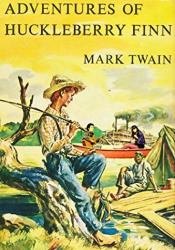The Adventures of Huckleberry Finn (1883) by Mark Twain
Mark Twain’s The Adventures of Huckleberry Finn (1883) has been heralded by critics as the first and most important American novel to be produced, ever. The fact that Twain chose a little poor farm boy to be his protagonist, and paired the boy up with a run-away slave, was unheard of in the world of novels. Twain does a commendable job of adopting the narrative voice of a young boy headed out for The West. One of the reasons this story has been cemented as a classic of American literature is because of the “relationship between sympathy on the one hand and bad morality on the other” (Bennett 123) that Twain brings forth and questions as Huck assists Jim in escaping. The scene when Huck rips up the letter comes to mind when I think of this relationship. Huck receives a letter that says he will go to Hell if he helps a runaway slave, and at this point, he is already helping Jim. He feels within his heart sympathy and decides that he’d rather go to Hell than refuse aid to Jim. In this powerful section, we see what true morality looks like though the eyes of an innocent child. The narrative voice of this work adds to the overall tone and message of the work as a whole.
Bennett, Jonathan. “The Conscience of Huckleberry Finn.” Philosophy, vol. 49, no. 188, 1974, pp. 123–134. JSTOR, www.jstor.org/stable/3750031.

